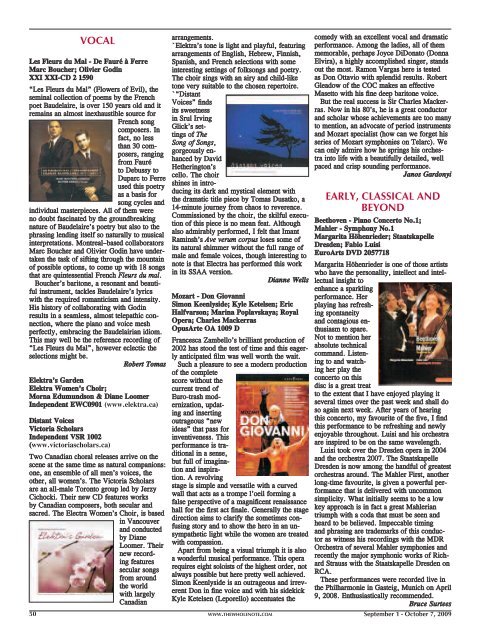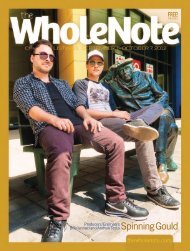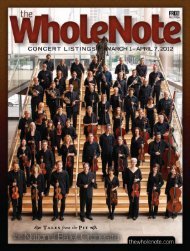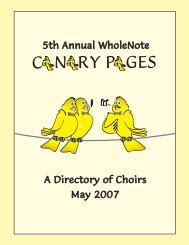VOCALLes Fleurs du Mal - De Fauré à FerreMarc Boucher; Olivier GodinXXI XXI-CD 2 1590“Les Fleurs du Mal” (Flowers of Evil), theseminal collection of poems by the Frenchpoet Baudelaire, is over 150 years old and itremains an almost inexhaustible source forFrench songcomposers. Infact, no lessthan 30 composers,rangingfrom Fauréto Debussy toDuparc to Ferreused this poetryas a basis forsong cycles andindividual masterpieces. All of them wereno doubt fascinated by the groundbreakingnature of Baudelaire’s poetry but also to thephrasing lending itself so naturally to musicalinterpretations. Montreal–based collaboratorsMarc Boucher and Olivier Godin have undertakenthe task of sifting through the mountainof possible options, to come up with 18 songsthat are quintessential French Fleurs du mal.Boucher’s baritone, a resonant and beautifulinstrument, tackles Baudelaire’s lyricswith the required romanticism and intensity.His history of collaborating with Godinresults in a seamless, almost telepathic connection,where the piano and voice meshperfectly, embracing the Baudelairian idiom.This may well be the reference recording of“Les Fleurs du Mal”, however eclectic theselections might be.Robert TomasElektra’s GardenElektra Women’s Choir;Morna Edumundson & Diane LoomerIndependent EWC0901 (www.elektra.ca)Distant VoicesVictoria ScholarsIndependent VSR 1002(www.victoriascholars.ca)Two Canadian choral releases arrive on thescene at the same time as natural companions:one, an ensemble of all men’s voices, theother, all women’s. <strong>The</strong> Victoria Scholarsare an all-male Toronto group led by JerzyCichocki. <strong>The</strong>ir new CD features worksby Canadian composers, both secular andsacred. <strong>The</strong> Electra Women’s Choir, is basedin Vancouverand conductedby DianeLoomer. <strong>The</strong>irnew recordingfeaturessecular songsfrom aroundthe worldwith largelyCanadianarrangements.`Elektra’s tone is light and playful, featuringarrangements of English, Hebrew, Finnish,Spanish, and French selections with someinteresting settings of folksongs and poetry.<strong>The</strong> choir sings with an airy and child-liketone very suitable to the chosen repertoire.`“DistantVoices” findsits sweetnessin Srul IrvingGlick’s settingsof <strong>The</strong>Song of Songs,gorgeously enhancedby DavidHetherington’scello. <strong>The</strong> choirshines in introducingits dark and mystical element withthe dramatic title piece by Tomas Dusatko, a14-minute journey from chaos to reverence.Commissioned by the choir, the skilful executionof this piece is no mean feat. Althoughalso admirably performed, I felt that ImantRaminsh’s Ave verum corpus loses some ofits natural shimmer without the full range ofmale and female voices, though interesting tonote is that Electra has performed this workin its SSAA version.Dianne WellsMozart - Don GiovanniSimon Keenlyside; Kyle Ketelsen; EricHalfvarson; Marina Poplavskaya; RoyalOpera; Charles MackerrasOpusArte OA 1009 DFrancesca Zambello’s brilliant production of2002 has stood the test of time and this eagerlyanticipated film was well worth the wait.Such a pleasure to see a modern productionof the completescore without thecurrent trend ofEuro-trash modernization,updatingand insertingoutrageous “newideas” that pass forinventiveness. Thisperformance is traditionalin a sense,but full of imaginationand inspiration.A revolvingstage is simple and versatile with a curvedwall that acts as a trompe l’oeil forming afalse perspective of a magnificent renaissancehall for the first act finale. Generally the stagedirection aims to clarify the sometimes confusingstory and to show the hero in an unsympatheticlight while the women are treatedwith compassion.Apart from being a visual triumph it is alsoa wonderful musical performance. This operarequires eight soloists of the highest order, notalways possible but here pretty well achieved.Simon Keenlyside is an outrageous and irreverentDon in fine voice and with his sidekickKyle Ketelsen (Leporello) accentuates thecomedy with an excellent vocal and dramaticperformance. Among the ladies, all of themmemorable, perhaps Joyce DiDonato (DonnaElvira), a highly accomplished singer, standsout the most. Ramon Vargas here is testedas Don Ottavio with splendid results. RobertGleadow of the COC makes an effectiveMasetto with his fine deep baritone voice.But the real success is Sir Charles Mackerras.Now in his 80’s, he is a great conductorand scholar whose achievements are too manyto mention, an advocate of period instrumentsand Mozart specialist (how can we forget hisseries of Mozart symphonies on Telarc). Wecan only admire how he springs his orchestrainto life with a beautifully detailed, wellpaced and crisp sounding performance.Janos GardonyiEARLY, CLASSICAL ANDBEYONDBeethoven - Piano Concerto No.1;Mahler - Symphony No.1Margarita Höhenrieder; StaatskapelleDresden; Fabio LuisiEuroArts DVD 2057718Margarita Höhenrieder is one of those artistswho have the personality, intellect and intellectualinsight toenhance a sparklingperformance. Herplaying has refreshingspontaneityand contagious enthusiasmto spare.Not to mention herabsolute technicalcommand. Listeningto and watchingher play theconcerto on thisdisc is a great treatto the extent that I have enjoyed playing itseveral times over the past week and shall doso again next week. After years of hearingthis concerto, my favourite of the five, I findthis performance to be refreshing and newlyenjoyable throughout. Luisi and his orchestraare inspired to be on the same wavelength.Luisi took over the Dresden opera in 2004and the orchestra 2007. <strong>The</strong> StaatskapelleDresden is now among the handful of greatestorchestras around. <strong>The</strong> Mahler First, anotherlong-time favourite, is given a powerful performancethat is delivered with uncommonsimplicity. What initially seems to be a lowkey approach is in fact a great Mahleriantriumph with a coda that must be seen andheard to be believed. Impeccable timingand phrasing are trademarks of this conductoras witness his recordings with the MDROrchestra of several Mahler symphonies andrecently the major symphonic works of RichardStrauss with the Staatskapelle Dresden onRCA.<strong>The</strong>se performances were recorded live inthe Philharmonie in Gasteig, Munich on April9, 2008. Enthusiastically recommended.Bruce Surtees50 WWW.THEWHOLENOTE.COM <strong>September</strong> 1 - October 7, <strong>2009</strong>
Grieg - Sonata; Lyrical Pieces;Holberg SuiteDerek Yaple-SchobertXXI XXI-CD 2 1604Claude Debussy once referred to the pianomusic of Edvard Grieg as “pink bon bonsfilled with snow.” Today this seems an unkinddescription, for generations of pianistshave delighted in these small gems (myselfincluded), and rightly so – Grieg was a suprememiniaturist, easily capturing a widerange of moods on a small canvas.This newCD featuringpianist DerekYaple-Schoberton the XXIlabel, is a delight,and offersa thoughtfully-chosenprogram ofGrieg’s pianomusic, rangingfrom the familiar to the less well-known.A native of Montreal, Yaple-Schobert (whobears an eerie physical resemblance to theyoung Grieg himself) has long had an affinitywith music by Nordic composers, havingstudied in both Denmark and Sweden. Here,he opens not with one of the small pieces,but with Grieg’s Sonata in E minor, an earlywork from 1865. <strong>The</strong> playing is confidentand boldly self-assured, as befits the impassionedmood of the music. More lyrical – andcertainly more familiar – are Shepherd Boyand Notturno from the Six Lyrical PiecesOp.54 (the entire set is included) whichYaple-Schobert treats with great finesse. Bycontrast, the March of the Trolls, a quickpacedrustic dance with its ostinato rhythmsprovides him an opportunity to demonstratean impressive technique.One of Grieg’s most familiar and popularpieces, the Holberg Suite has been heard sooften in its version for string orchestra thatwe tend to forget that it originally began as asolo piano piece. In Yaple-Schobert’s capablehands, the neo-Baroque spirit comes throughadmirably, and from the beginning, he hasno trouble in convincing us that this music isas well suited to the solo keyboard as it is toa string orchestra. So I would say gratulerer(congratulations) to Mr. Yaple-Schobert on afine recording. Bon bons filled with snow? Ithink not!Richard Haskellmake these two an interesting pairing is nottheir supposed similarities but their clear andcontrasting differences.Each is represented by a sonata for violinand piano - No.2 of Schumann, No.1 of Bartok- and a solowork - Bartok’ssolo violin sonatafor Kremerand Schumann’sKinderszenenfor Argerich.<strong>The</strong> duoworks could notbe more differentin sound orstyle, with Schumann’s conservative approachtreating the somewhat subdued violin as partof the overall texture, while Bartok treats thetwo instruments independently, making greattechnical demands of the players. Kremerand Argerich have been performing togetherfor many years (they recorded the Schumannsonatas for DGG in 1986) and it shows - theyclearly think and feel as one.<strong>The</strong> solo works, too, are simply light yearsapart. Both receive outstanding performanceshere, but Kremer’s stunning playing in the fiendishlydifficult Bartok really steals the show.Audience presence is apparent before andafter each work, but thankfully never for amoment during the performances.Two Kreisler encores, Liebeslied and SchonRosmarin, round out this attractively-priced set.Terry RobbinsFrench Flute Chamber MusicMirage QuintetNaxos 8.570444for the harp; it’s true chamber music, with asophisticated interplay of instrumental forces.I particularly like the way the Mirage playersdig into the final movement’s big, emphaticchords with an expansive sweep.Similarly, Florent Schmitt’s Suite en rocailleOp. 84 is an elegant work – althoughthere’s an edgy urgency in the second andfourth movements. And Gabriel Pierné’sVariations libres et finale derives an archaicquality from the composer’s use of the Lydianmode. Jean Françaix’s Quintette is acharming piece; and so is Roussel’s SérénadeOp. 30, although its instrumental effects andharmonic leanings also give it a quirky, modernistquality.This isn’t the deepest music ever written –it’s a little too suave to be profound. But it isenjoyable, and very well performed.Colin EatockMODERN ANDCONTEMPORARYStravinsky and the Ballet Russes -<strong>The</strong> Firebird; <strong>The</strong> Rite of Spring<strong>The</strong> Mariinsky Orchestra and Ballet;Valery GergievBelAir classiques DVD BAC041This is an outstanding and important documentof an historic event. <strong>The</strong> celebrated riotthat occurred on the 6th of May, 1913 duringthe first performance of the new ballet,Le Sacre du Printemps was the expressionby the outraged audience at being assaultedvisually and aurally by Sergei Diaghilev andhis Ballets Russes. A year earlier Diaghilevhad delighted them with a work commissionedfrom Ravel,Daphnis et Chloë,choreographed byMichel Fokine. EarlierVaslav Nijinskyhad caused a minorriot with his languid,homo-erotic visionof Debussy’s Preludeà l’apres-midid’un faune, whichhe was obliged tosecretly choreographin his room. But LeSacre was something new, unheard of andunexpected in every respect. Pounding andbrutal rhythms with rapid time changes drovethe dancers to unrefined movements and inelegantposes. In a complete reversal of theusual order of things, Le Sacre began withthe music for which a storyline had to be devised.It became the rites of an ancient Slavictribe attempting to alter their destiny. <strong>The</strong>night of May 6, 1913 was the beginning ofthe end of Le Belle Epoch. WW1 didn’t help.If you buy this DVD, as you really should,be sure to watch and absorb the bonusfeatures, including an interview with arthistorian Kenneth Archer and MillicentDodson whose re-construction of Nijinsky’sI’m not sure how “real” the Mirage Quintetis – a quick Google of the name reveals noreferences to concerts performed anywhere,and the ensemble’s discography seems to consistentirely of this recording.But never mind. Even if the group is just amirage, its playersare all finemusicians: Canada’sreigningflutist, RobertAitken; leadingstudio musicianand Aitken’slong-time recitalpartner, harpistErica Goodman;violinist Jacques Israelievitch, recently retiredas concertmaster of the Toronto Symphony<strong>The</strong> Berlin RecitalOrchestra; and violist Teng Li and cellistGidon Kremer; Martha ArgerichWinona Zelenka, both current principals ofEMI Classics 6 93999 2that orchestra.<strong>The</strong> first thing that strikes you about this 2CD<strong>The</strong> music is also quite fine: several worksset, recorded in concert at the Berlin Philharmoniein December 2006, is the obvious dis-are thoroughly impressionistic in style, othersare touched with neo-classicism, but allparity between the two featured composers,are very French. CD collectors shouldn’t beSchumann and Bartok. <strong>The</strong> links suggesteddiscouraged if some of the early 20th-centuryin the booklet notes - two pianist-composerscompositions recorded here are unfamiliar.who wrote for every musical genre and wereMarcel Tournier was himself a harpist, asboth interested in musical education - are unconvincingand tenuous at best, but what doeshis lush writing for the instrument suggests.But his Op.34 Suite isn’t just a showpiece<strong>September</strong> 1 - October 7, <strong>2009</strong> WWW.THEWHOLENOTE.COM 51
















